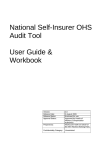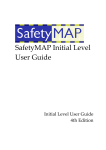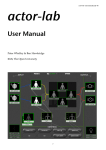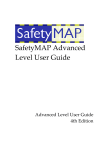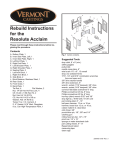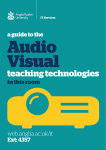Download User Guide - School-based Apprenticeships and Traineeships
Transcript
School–based apprenticeships and traineeships USER GUIDE School-based apprenticeships and traineeships _ USER GUIDE 1 Contents Page Preface Page 1. purpose 3 2. related information 3 3. overview 3 Section 1 pullout checklist 4 Section 2 useful contacts 5 Section 3 detailed implementation guide 6 Section 4 roles and responsibilities 10 Section 5 other information 13 Section 6 forms you might need 16 Abbreviations used in this section DET - Department of Employment and Training DOEM – Department of Education Manual ETES – Education, Training and Employment Schedule NAC – New Apprenticeships Centre QSA – Queensland Studies Authority RTO – Registered Training Organisation SDCS – School Data Capture System SRTO - Supervising Registered Training Organisation School-based apprenticeships and traineeships _ USER GUIDE 2 Preface 1. purpose This School-based Apprenticeships and Traineeships User Guide (hereafter known as the User Guide) has been designed as a practical, step-by-step guide for use by school personnel responsible for the implementation and coordination of school-based apprenticeships and traineeships in Education Queensland schools. * This version (March 2006) supersedes all previous versions of the User Guide. 2. related information Departmental policy, procedures and advice about school-based apprenticeships and traineeships can be found in the Department of Education Manual (DOEM) under Curriculum and Studies (CS-28 — School-based Apprenticeships and Traineeships) or on the Senior Education and Training Pathways in Queensland website at: www.education.qld.gov.au/students/senior/ 3. overview This User Guide is comprised of six sections: Section 1: Step-by-step checklist Section 2: Useful contacts Section 3: Detailed implementation guide Section 4: Summary of stakeholder roles and responsibilities Section 5: Other information Section 6: Forms relating to school-based apprenticeships and traineeships School-based apprenticeships and traineeships _ USER GUIDE 3 Section 1 Implementation Checklist Promotion brochures newsletters relationships contact person Facilitation student interest employer interest connect the two Management timetable student goals ETES training plans keep accurate records Department of Education Manual (DOEM) CS – 28 School-based Apprenticeships and Traineeships http://education.qld.gov.au /corporate/doem/curristu/c urristu.html Monitoring students’ progress refer problems notify DET of changes report competencies School-based apprenticeships and traineeships _ USER GUIDE 4 Section 2 Useful Contacts Education Other Government Education Queensland Curriculum Branch Tel.: 07 3237 1053 Fax: 07 3237 0102 Website: http://www.education.qld.gov.au/students/senior Association of Independent Schools of Queensland (AISQ) Tel.: 07 3228 1515 Fax: 07 3228 1595 Website: www.aisq.qld.edu.au Department of Employment and Training (DET) Training: 1300 369 935 Wages: 1300 369 945 Health and safety: 1300 369 915 Employment programs: 1300 369 925 Website: http://www.trainandemploy.qld.gov.au/ Department of Education, Training (DEST) Tel.: 07 3223 1000 Website: www.dest.gov.au Science and Queensland Catholic Education Commission (QCEC) Tel.: 07 3224 3311 Fax: 07 3229 0907 Website: www.qcec.qld.catholic.edu.au Queensland Studies Authority (QSA) Tel.: 07 3864 0299 Fax: 07 3221 2553 Website: www.qsa.edu.au Employment Training New Apprenticeships Centres (NAC) Tel.: 1800 639 629 Website: www.newapprenticeships.gov.au Group Training Australia (GTA) Tel.: 07 3844 3444 (those group training organisations that are members of Group Training Australia). Alternatively contact your local office of DET. Website: www.gtaltd.com.au Centrelink’s homepage Website :www.centrelink.gov.au Jobs and careers Website www.dest.gov.au/jobguideonline/ Australian Job Search Website www.jobsearch.dest.gov.au National Training Information Service (NTIS) Website: www.ntis.gov.au Supervising Registered Training Organisations (SRTOs) Contact your local DET regional office or see the DET website. TAFE Queensland Website:www.tafe.net Advice Anti-Discrimination Commission Tel.: 1800 068 305 WorkCover Tel.: 1300 362 128 School-based apprenticeships and traineeships _ USER GUIDE 5 Section 3 Detailed implementation and coordination guide Step 1 Promotion While the majority of schools offering post-compulsory education already support students in school-based apprenticeships and traineeships, all schools can benefit by improving and mainstreaming their promotion of the program. One effective way to mainstream promotion of the program within the school community is to incorporate school-based apprenticeships and traineeships into the school’s annual plans. Here are some other tips to assist in promoting the program within the school community: • Raise awareness of the program. The Senior Phase of Learning Team, Curriculum Strategy Branch has produced a number of posters and brochures that can be placed on student noticeboards and common areas. These materials can be downloaded from: www.education.qld.gov.au/students/senior Articles about the program can feature in local school and community publications, and can be included as an agenda item at meetings of parents and citizens, and parents and students. Opportunities for students to enter the program, including job vacancies, may also be announced at whole-school assemblies. Links with the wider community of employers and the local chamber of commerce are also encouraged. • Provide accurate and concise information about the program. Information about the program has been included in the DOEM module, CS-28 — School-based Apprenticeships and Traineeships, and within this User Guide. Similarly, brochures aimed at informing students and employers have been produced by both Education Queensland and DET. DET regional offices are excellent points of contact, the offices can be contacted using DET’s free call number – 1300 369 935. Additional information can also be obtained via relevant websites (see Useful Contacts). • Undertake joint marketing exercises with other VET stakeholders. Joint marketing by schools with other major vocational education and training stakeholders in the community has a number of benefits for all concerned. It strengthens working relationships between the various sectors, promotes sharing of the most up-to-date information, and increases the likelihood that students, guardians and employers will receive consistent information on conditions and responsibilities related to the program. • Identify a reliable and knowledgeable contact person within the school. As marketing exercises are designed to generate interest in the program, it is essential for the school to provide students, guardians, employers and other vocational education and training stakeholders with the name of a reliable and knowledgeable contact person within the school. The school contact person needs to maintain upto-date information about the program, have suitable resources to promote it, coordinate the administration relating to students in the program, and up-skill other school staff about the program. When marketing specifically to school staff, schools may consider: • informing all staff about the program and its potential impact on student timetabling and subject selection and deletion; School-based apprenticeships and traineeships _ USER GUIDE 6 • • • promoting multiple opportunities for student learning both inside and outside the classroom; encouraging and maintaining communication about student progress between class teachers and staff responsible for coordinating the program; including a number of key staff such as the guidance officer, heads of departments, and administration personnel in the marketing process. When marketing specifically to employers, schools may consider: • organising a promotion of the program and attracting publicity from local media; • providing employers with simple handouts summarising what they can gain by participating in the program. The Education Queensland brochure What are Schoolbased Apprenticeships and Traineeships? Information for employers and the DET brochure School-based Apprenticeships and Traineeships – Information for employers, outlines these gains clearly; • keeping employers informed and involved in relevant school activities throughout the year; • referring employers to appropriate authorities who can answer questions about wage entitlements and other employment conditions, workplace health and safety, contractual responsibilities and training issues. When marketing specifically to students and parents, schools may consider: • presenting information about school-based apprenticeships and traineeships prior to students’ selection of senior secondary subjects; • holding a variety of information sessions about the program, such as parent–student evenings, and whole-of-year and targeted sessions. The level of information provided at each forum will depend on the audience’s existing level of knowledge about the program; • providing concise information about the impact of school-based apprenticeships and traineeships on attaining an Overall Position, and the gains to be made by students who participate in the program. The Education Queensland brochure What are School-based Apprenticeships and Traineeships? Information for students, outlines these opportunities clearly; • inviting other vocational education and training stakeholders — such as NACs, RTOs, potential employers and DET local office staff — to information sessions. Contributions by these stakeholders will ensure students get the most up-to-date information and allows them the opportunity to meet personnel from the agencies that may be assisting them in the future; • inviting past school-based apprentices and trainees to talk about their experiences and the benefits of the program. Step 2 Facilitation The purpose of promotional activities is to generate interest in the program. From these exercises schools should be able to generate a list of interested students and/or employers. To facilitate further discussion between these stakeholders, schools may: • learn more about the program and meet one another; • arrange a list of interested students for any employer vacancy that may arise (with the permission of those students); • assist with the application and/or preliminary selection process by providing a meeting venue, arranging student release from class and assisting students with resume and interview preparation. Step 3 Management For the purposes of school-based arrangements, the young person is considered both a full-time school student and an apprentice or trainee. Ensure appropriate adjustments School-based apprenticeships and traineeships _ USER GUIDE 7 are made to the student's program of school study and that subject selection or deletion does not jeopardise the student’s education goals. School-based arrangements allow for both paid employment and training with the nominated SRTO to be conducted during the school week, as negotiated by the school, student, guardian, employer, and SRTO. How the school adapts the timetable of students will vary depending on the particular school’s policy on subject selection and deletion. Guidance officers can assist students to select subjects that will not jeopardise their education goals but will complement their career plans. Timetabling should reflect a blend of general education, paid employment and training delivered by the nominated SRTO, and should be recorded on the Education Training and Employment Schedule (see Schedule 1). The ETES draws together the vocational training arrangements and pattern of work with the student’s program of school study. How the week will be structured should be negotiated between the employer, school personnel, student, guardian, and SRTO. As stated in Sections 4.1 and 8 of the DOEM module CS-28 School-based Apprenticeships and Traineeships, the principal is responsible for ensuring that appropriate alterations are made to the student’s program of school study to satisfy both the student’s general education goals and school-based apprenticeship or traineeship requirements. The school may refuse to endorse any school-based arrangement it believes may jeopardise the education and post-school goals of the student. The ETES has a number of uses. Its primary use is to outline the integration of the student’s education, training and employment programs, confirm school awareness about each apprenticeship or traineeship within the school and verify that the school has adjusted the student’s program of school study to meet both general education and apprenticeship or traineeship requirements. A copy of the ETES is located in Schedule 1 of this User Guide. A copy of the fully signed ETES should be retained for the school files. The SRTO is required to develop a training plan during probation for each apprentice or trainee. The training plan provides a structured approach to the selection and attainment of competencies for a particular vocational qualification for the student. The school may participate in the development of the training plan, where appropriate. A training record book should also be developed by the SRTO to monitor and record the progress of the apprentice/trainee throughout the qualification. The training plan should be attached to the training record book. While schools are not allowed to enter subcontracting arrangements of a financial nature with the supervising SRTO, mutual recognition provisions apply. Step 4 Monitoring Schools, upon endorsing an apprenticeship or traineeship (school-based), have a duty of care to ensure that the program does not impact negatively on the student’s progress towards general education goals. To meet this responsibility, school personnel responsible for coordinating students who have entered apprenticeships and traineeships can negotiate regular feedback from the student, employer, RTO, class teachers, guardian, and/or other involved stakeholders regarding the student’s progress. Schools are encouraged to participate in the student’s induction process, which must be provided by the NAC or the RTO prior to the School-based apprenticeships and traineeships _ USER GUIDE 8 registration of the training contract. It is important that schools are familiar with the school-based apprenticeship and traineeship induction process, currently outlined on DET’s website. Problems While it is recognised that the school has no legal responsibilities or obligations in relation to the training contract, the school does have a duty of care to ensure that an endorsed apprenticeship or traineeship does not adversely affect the student or the student’s general education goals. Section 6 of the DOEM module CS-28 — School-based Apprenticeships and Traineeships outlines in detail the various situations that may arise during the course of the traineeship or apprenticeship, and the appropriate authorities to which the student may be referred to in order to resolve any problems. Contact numbers for each authority are located in Section 4 of this guide. Section 8 of the module also provides some general points related to duty of care. As stated in the DOEM module, ‘schools are encouraged to further refine points [related to duty of care] in their internal documentation’. Changes To maintain consistent and valid data about students involved in school-based apprenticeships and traineeships in schools, principals or their nominated delegates are asked to notify DET of any change to the student details. Student details which need to be reported to DET by the school are: • change of student’s name/address; • change of school. Some specific changes to the training contract which need to be reported to DET by the employer are: • cancellation of the training contract; • completion of the qualification by the student; • conversion of the arrangement into either part-time or full-time; • students articulating into another qualification while still at school. DET must be advised if a student engaged in a school-based apprenticeship or traineeship changes schooling sectors. Students who have previously left the schooling sector and have taken up a apprenticeship or traineeship but now wish to return to post-compulsory schooling are eligible to convert their apprenticeship or traineeship to schoolbased arrangements. The school will need to arrange for the completion of an ETES. The Queensland Certificate of Education, issued by the QSA, will include qualifications and competencies achieved by students undertaking school-based apprenticeships and traineeships. Throughout the school year, school personnel may enter competencies achieved by students onto the Student Data Capture System. Statements of Attainment produced by SRTOs should be used as evidence that students have actually achieved competencies through a school-based apprenticeship or traineeship. No results should be entered onto SDCS without school personnel having sighted that evidence. Schools must, however, have completed entering student achievement data on to SDCS by the last QSA disk for Year 12 students. School-based apprenticeships and traineeships _ USER GUIDE 9 Section 4 Roles and Responsibilities Who Role and Responsibilities • Department of Employment and Training • • • • • • • • • • • Senior Phase of Learning Team, Education Queensland • • • • Administers all apprenticeships and traineeships through the Vocational Education, Training and Employment Act 2000 (Qld); Registers all apprenticeships and traineeships and issues each one with a unique identification number; Provides mediation, counselling and dispute resolution services to parties involved in training contracts; Provides support for expenses relating to travel and accommodation, and special needs support, when the student leaves the schooling sector; Investigates complaints relating to training and employment conditions for all apprentices and trainees; Provides advice and assistance to schools and employers on relevant issues associated with all apprentices and trainees; Provides statistical information on all apprentices and trainees; Liaises with school sectors and employers regarding special provisions for apprentices and trainees under school-based arrangements; Provides payment to SRTOs for the delivery of apprenticeship and traineeship training; Liaises with QSA regarding the recording of student’s competencies on the Senior Certificate; Issues the apprentice or trainee with a Certificate of Completion upon attainment of the vocational qualification. Provides timely and accurate information and advice about apprenticeships and traineeships under schoolbased arrangements to schools and other vocational education and training stakeholders; Liaises with stakeholders including schools and DET about issues relating to school-based apprenticeships or traineeships including monitoring and evaluation; Provides, upon application, financial support for travel and accommodation by the school-based apprentice or trainee to the closest SRTO, and for any additional support required by students who have special needs; Accesses the DET database of students participating in the program. School-based apprenticeships and traineeships _ USER GUIDE 10 • The school-based apprentice or trainee • • • The guardian (parent/caregiver) • • • Principal or authorised delegate • • • • • • • • The employer of • the apprentice or trainee (school• based) • • • • Meets employment and training obligations as stated in the training contract, training plan, Vocational Education, Training and Employment Act 2000 (Qld) and relevant industrial award or certified agreement; Discusses with the school and employer progress towards senior studies and the vocational qualification; Negotiates continuation of the apprenticeship or traineeship under full-time or part-time employment arrangements if it is not completed while the student is still at school. Signs the training contract where the student is under 18 years of age; Monitors the student’s performance and attendance; Liaises with the school and employer about the student’s progress. Discusses with the student and parent, subject selection or deletion, workload, and days and times to be spent in work, school, and training to meet the requirements of the apprenticeship or traineeship; Facilitates appropriate alteration to the student’s program of school study to satisfy requirements for a student to undertake an school-based apprenticeship or traineeship; Assists in the completion of the ETES with the other signatories to the document, in particular, documenting the balance of school, recognised training and work; Retains a fully signed copy of the ETES for the school’s records; Offers assistance to the SRTO in the development of the training plan; Refers students and their employers to appropriate authorities should problems arise; Monitors the student’s progress across both senior studies and the school-based apprenticeship or traineeship; Ensures achieved competencies and qualifications are recorded on the Senior Data Capture System. Selects an appropriate student; Selects a NAC to facilitate the completion and lodgement of the Training Contract and the transfer of appropriate incentives; Selects an SRTO to deliver formal training; Meets employment and training obligations as stated in the training contract, training plan, Vocational Education, Training and Employment Act 2000 (Qld) and relevant industrial award or certified agreement; Provides feedback on the student’s progress; to the student, guardian and school; Negotiates with the student about continuing the apprenticeship or traineeship post-school under parttime or full-time employment arrangements; Forwards details of conversion arrangements to DET. School-based apprenticeships and traineeships _ USER GUIDE 11 • Supervising • Registered Training • Organisation • • • • • • • • • • New Apprenticeships Centre • • • • • Queensland Studies • Authority The School-Based Apprenticeships and Traineeships Advisory Committee • Assesses the student’s current skills; Assists the NAC with the induction process; In consultation with the school applies to the schooling sector for support funding for students with special needs; Liaises with the employer and student to design the training plan; Issues the student with a training record book for monitoring progress; Consults with the school regarding delivery/recognition of competencies already within the school curriculum and credits them where appropriate; Delivers training in accordance with the training plan; Visits the student at the workplace for training and monitoring purposes; Undertakes assessment and/or provides assessment advice; Issues a Statement of Attainment to the student for competencies attained whilst at school as part of the traineeship or apprenticeship; Provides copies of statements of attainment/results to the school; In the case of Year 12 students results need to be provided to the school in early November to ensure inclusion on student’s Queensland Certificate of Education; Provides DET with evidence that the requirements of the vocational qualification have been met. Conducts the induction program prior to registering the training contract in conjunction with the supervising RTO; Advises on all Commonwealth financial incentives and processes payments relating to all apprenticeships and traineeships; Advises on State employment incentives relating to all apprenticeships and traineeships; Assists the employer, student and guardian (if applicable) to complete all necessary paperwork associated with the Training Contract; Advises the employer, student and guardian of training and employment obligations under the training contract Facilitates the entry by schools of apprenticeship and traineeship competencies/qualifications on the SDCS. Provides strategic advice concerning the implementation of school-based apprenticeships and traineeships. School-based apprenticeships and traineeships _ USER GUIDE 12 Section 5 Other Information Features: credentials, employer incentives, industrial relations, min/max time requirements, paying for uniforms and equipment, probation, provision of materials, student fees, student support services, students under 16 years of age, travel accommodation and assistance, tuition fees, wages, workers compensation and youth allowance. Credentials - The objective of the school-based apprenticeship and traineeship program is the attainment of the Queensland Certificate of Education and a VET qualification. In some cases, a school-based trainee will exit with a vocational qualification. In other cases the qualification will be achieved at a later date. The SRTO issues a qualification and statement of results for the modules/competencies the student has completed. DET issues a certificate of completion once it is notified by the SRTO that the appropriate competencies have been achieved. Employer incentives (Federal) - A commencement incentive is paid by the NAC to the employer three months after the end of the probationary period for Certificate II and higher. Progression and completion incentives are available for Certificate III and above. For further details regarding employer incentives, including State, contact your local NAC or access its website. Industrial relations - Provision is being made industry by industry, through awards and orders of the Queensland Industrial Relations Commission, for school-based apprenticeships and traineeships covering employment conditions and wages. It is recommended that school personnel do not advise on wages and conditions of employment, because of legal ramifications. Employers and apprentices and trainees should be referred to Wageline – 1300 369 945. Minimum/Maximum time requirements - There is a clear distinction between school-based apprenticeships/traineeships and part-time apprenticeships/ traineeships. For a part-time apprenticeship/traineeship, the minimum hours worked must be no less than 15 hours per week averaged over a four-week period. *a ‘day’ is defined by the relevant industrial instrument For school-based apprenticeships and traineeships, a minimum of 48 days* of paid work must be undertaken for each year of the school-based apprenticeship or traineeship. Hours worked that do not constitute a full ‘day’ can contribute to the cumulative total. There is no maximum time per week limitation for school-based apprenticeships and traineeships. These characteristics were designed to provide maximum flexibility in arrangements. It is through negotiation between the school, employer, SRTO and the student that the mix of work, training and school are timetabled to ensure that the student will have optimal opportunities to achieve the competencies within the apprenticeship/traineeship qualification. School-based apprenticeships and traineeships _ USER GUIDE 13 Paying for uniforms and equipment - If it is a requirement that a uniform, safety equipment and/or tools be provided, the relevant industrial award or contract should specify what the employer should provide. A tool allowance is payable to Certificate III apprentices only — that is, trainees are NOT entitled to receive a tool allowance in any industry. Probation - The probationary term is provided to allow both the employer and apprentice/trainee an adjustment period and time to evaluate the training requirements and the ability of the other party to undertake and deliver the training. During the probationary term, either party may terminate the training contract, with one week’s notice. Apprenticeships and Traineeships approved by the Training Recognition Council after 28 September 2000 will have probationary periods of: Apprenticeships 90 days Traineeships 30 days New Apprenticeship Centres should clarify the length of the probationary period for each school-based apprenticeship or traineeship. Special Needs - Financial subsidy for support of school-based apprentices and trainees with special needs. Education Queensland approves financial subsidies to SRTOs or schools to assist school-based apprentices and trainees with special needs. This subsidy assists with the provision of tutorial assistance, note takers and interpreters. Guidelines for this support are available at www.education.qld.gov.au/students/senior/ Student fees payable for Certificate III and above All apprentices and trainees at Certificate III or above will be subject to tuition fees and student support fees in all forms of training delivered by the SRTO except where a module or unit of competency is being delivered via work-based training. Student support services - The SRTO may choose to charge apprentices/trainees at AQF Certificate III or above a student support services fee to a maximum of $0.22 per maximum nominal hour for each module or unit of competency delivered to cover the provision of student support services such as counsellors, activities coordinators, security and library services. The maximum amount of student services fees charged to an apprentice/trainee in a consecutive 12-month period must not exceed $167.00. Provision of materials - Under all delivery methods, the SRTO must provide to the apprentice basic materials deemed essential to achieving the competencies for the training either free of charge or on a loan basis. The SRTO must issue the required training record book to the apprentice/trainee at no cost. Students under 16 years of age – School-based apprenticeships and traineeships are primarily designed for students in Years 11 and 12. Students enrolled in Year 10 may participate, provided students who are under 16 years of age obtain the required dispensation from the Department of Education and the Arts to undertake paid employment during school hours. In exceptional circumstances, students in Years 8 and 9 may be considered eligible provided: o the Principal, and all parties to the training contract, deem such participation is in the best educational interests of the student; and School-based apprenticeships and traineeships _ USER GUIDE 14 o the student, if under 16 years of age, has received dispensation from the Department of Education and the Arts to undertake paid employment during school hours; and o a business case detailing the particular circumstances of the school-based apprenticeship or traineeship has been lodged with the appropriate Department of Employment and Training (DET) regional office; and o approval of the Training and Employment Recognition Council or its delegate is gained prior to entering into a training contract. Dispensations for periods of less than one school year, for the purposes of undertaking a school-based apprenticeship or traineeship, can be approved by the school Principal. For periods longer than one school year, approval must be sought from the Executive Director (Schools). Further information and application forms are available on the Education Queensland intranet at http://iwww.qed.qld.gov.au/students/dispensation. Officer’s Name: Position: Branch: Contact Number: Stephanie Curtis Senior Education Officer School Performance, Office Queensland 3237 0248 of Education Travel and accommodation assistance - Education Queensland provides financial assistance to subsidise additional expenditure incurred by school-based apprentices and trainees who travel more than 100 km (round trip) to attend off-the-job training at their nearest appropriate SRTO. This training must be part of their apprenticeship or traineeship off-the-job component. Guidelines for this support are available at: http://www.education.qld.gov.au/students/senior/ Wages - The apprentice/trainee is to be paid by the employer for the time spent in productive work only (not while attending off-the-job training). Wages are determined on a pro-rata basis of those full-time apprentices. How this is calculated and arranged may differ between industries and individual arrangements. Contact Wageline for more details. If the student has not completed the qualification by the end of Year 12, then the day after, the student will convert to a full-time or part-time apprenticeship/traineeship, whichever is negotiated by the employer and apprentice/trainee. This means that after Year 12, the employer is required to pay for time at work and time in training, under the prescribed conditions of an apprenticeship/traineeship under the Vocational Education, Training and Employment Act 2000 (Qld). Workers compensation - At school the usual insurance provisions apply to students while undertaking normal school-based education subjects. In the workplace, workers compensation is provided for the apprentice under the employer’s existing workers compensation insurance. This cover extends to include travel to and from work and training, as well as the time spent in training. School-based apprenticeships and traineeships _ USER GUIDE 15 Section 6 Forms you might need Forms relating to school-based apprenticeships and traineeships Education Training and Employment Schedule (ETES) The ETES outlines the student's education, training and work program and must be signed by all key stakeholders associated with the training contract. This form can be downloaded from: http://education.qld.gov.au/students/placement/vet/html/apprent.html - forms School-based apprenticeships and traineeships _ USER GUIDE 16


















